- Ciubotaru, I., Lee, Y., & Wander, R. C. (2003). Dietary fish oil decreases C-reactive protein, interleukin-6, and triacylglycerol to HDL-cholesterol ratio in postmenopausal women on HRT. The Journal of Nutritional Biochemistry,14(9), 513-521. doi:10.1016/s0955-2863(03)00101-3
- Innes, J. K., & Calder, P. C. (2018). Omega-6 fatty acids and inflammation. Prostaglandins, leukotrienes, and essential fatty acids, 132, 41–48. https://doi.org/10.1016/j.plefa.2018.03.004
- Maroon, J. C., & Bost, J. W. (2006). ω-3 Fatty acids (fish oil) as an anti-inflammatory: An alternative to nonsteroidal anti-inflammatory drugs for discogenic pain. Surgical Neurology,65(4), 326-331. doi:10.1016/j.surneu.2005.10.023
- Medeiros-de-Moraes, I. M., Gonçalves-de-Albuquerque, C. F., Kurz, A., Oliveira, F., de Abreu, V., Torres, R. C., Carvalho, V. F., Estato, V., Bozza, P. T., Sperandio, M., de Castro-Faria-Neto, H. C., & Silva, A. R. (2018). Omega-9 Oleic Acid, the Main Compound of Olive Oil, Mitigates Inflammation during Experimental Sepsis. Oxidative medicine and cellular longevity, 2018, 6053492. https://doi.org/10.1155/2018/6053492
- Virtanen, J. K., Mursu, J., Voutilainen, S., & Tuomainen, T. P. (2018). The associations of serum n-6 polyunsaturated fatty acids with serum C-reactive protein in men: the Kuopio Ischaemic Heart Disease Risk Factor Study. European journal of clinical nutrition, 72(3), 342–348. https://doi.org/10.1038/s41430-017-0009-6







 Buy now
Buy now
























[0]